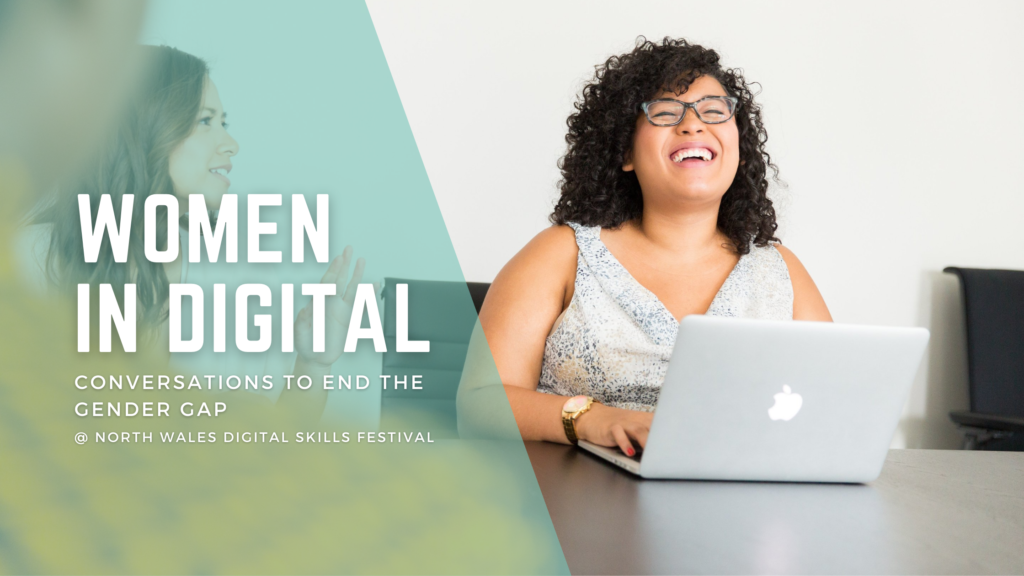Women in Digital Q&A – DCW team members speak on their experience as women working in the digital space
Digital Inclusion Trainer, Ema Williams writes about her experience as part of the Women in Digital Q&A panel at the North Wales Digital Skills Festival, along with Digital Inclusion Advisor, Lon Moseley

A promotional banner reading ‘WOMEN IN DIGITAL, CONVERSATIONS TO END THE GENDER GAP @ NORTH WALES DIGITAL SKILLS CENTRE’. The image features a smiling young lady sat at a desk using an Apple laptop.
Towards the end of November, Lon and I were invited by Careers Wales to a bilingual Q&A panel to speak about our experiences as women working in digital in North Wales. The event was a part of the North Wales Digital Skills Festival, held from the 22nd to the 27th of November 2021, which included workshops, tutorials and talks to encourage people to learn new digital skills.
The primary aim of the Careers Wales panel was to ensure that female students and unemployed adults had the knowledge to pursue a career in digital, an industry which historically has had a disproportionate gender balance (highlighted by the fact that only 5% of leadership positions in the technology sector are held by women, according to research carried out by PWC).
The panel was held over two days; Lon joined the Welsh panel on Wednesday the 24th of November, and I joined the English panel on Thursday the 25th. Our co-panellists were professional women ranging from Data Analysers to ICT Assistants, that have had a wide variety of qualifications, experience, and knowledge to get where they are today. Lon and I joined to represent Digital Communities Wales, as an Adviser and a Trainer respectively, to give the students perhaps a different look at digital, and how they can positively impact people’s day to day lives because of it.
A very strong theme in many of the answers related to the attitudes of people going into digital, and especially encouraging female students to think outside the box when it comes to their career prospects. A study conducted by PWC in 2017 showed that the top reason that women don’t pursue a career in technology or digital is because too little information or advice is given on what working in tech actually involves. That’s why it’s crucial that these conversations are happening at an early stage of these girls’ careers, to begin to normalise digital as a viable career path for all genders.
An interesting pattern we found was that many of the women on the panel (myself and Lon included) had not studied anything relating to digital at university, with several of us sharing that we’d been encouraged to do more creative, classically feminine subjects such as English Literature or Art. This directly reflects the statistic by PWC that only 16% of women have had a career in technology suggested to them (as opposed to 33% of men). What was particularly inspiring to me was that many of the panellists (again, myself included) found our interest in digital post-graduation, and thus encouraging the students to break the status quo when it comes to what they should be studying or pursuing. Not only that, but it was also inspiring for adults to hear that a change of career direction into digital is possible post-graduation.
Another interesting conversation that was had during the panel was the fact that many digital jobs require a high level of communication skills. Whether you’re an ICT Assistant explaining the process of fixing a technical issue, or you’re a trainer like me trying to break down the jargon of everyday online use. In response to this, in Lon’s panel, there was also a focus on how there’s a shortage of certain skills when it comes to the digital sector, and more specifically a shortage of Welsh language skills. Having the ability to communicate with someone about a foreign subject such as technology in their mother tongue can make an incredible difference in someone’s understanding of the topic. Communication and Welsh Language skills can be acquired by anyone, regardless of gender, so knowing that these are highly desirable qualities can work to many young women’s advantage.
The same study by PWC in 2017 conducted on over 2000 A-Level and University students highlighted that 78% of students couldn’t name a famous female working in technology. It’s my hope that in years to come more and more women will be educated on the many benefits of building their careers around digital (with thanks to panels and talks such as this one), and findings from research such as this will result in less stark statistics.
Written by Ema Williams, Digital Inclusion Trainer at Digital Communities Wales

